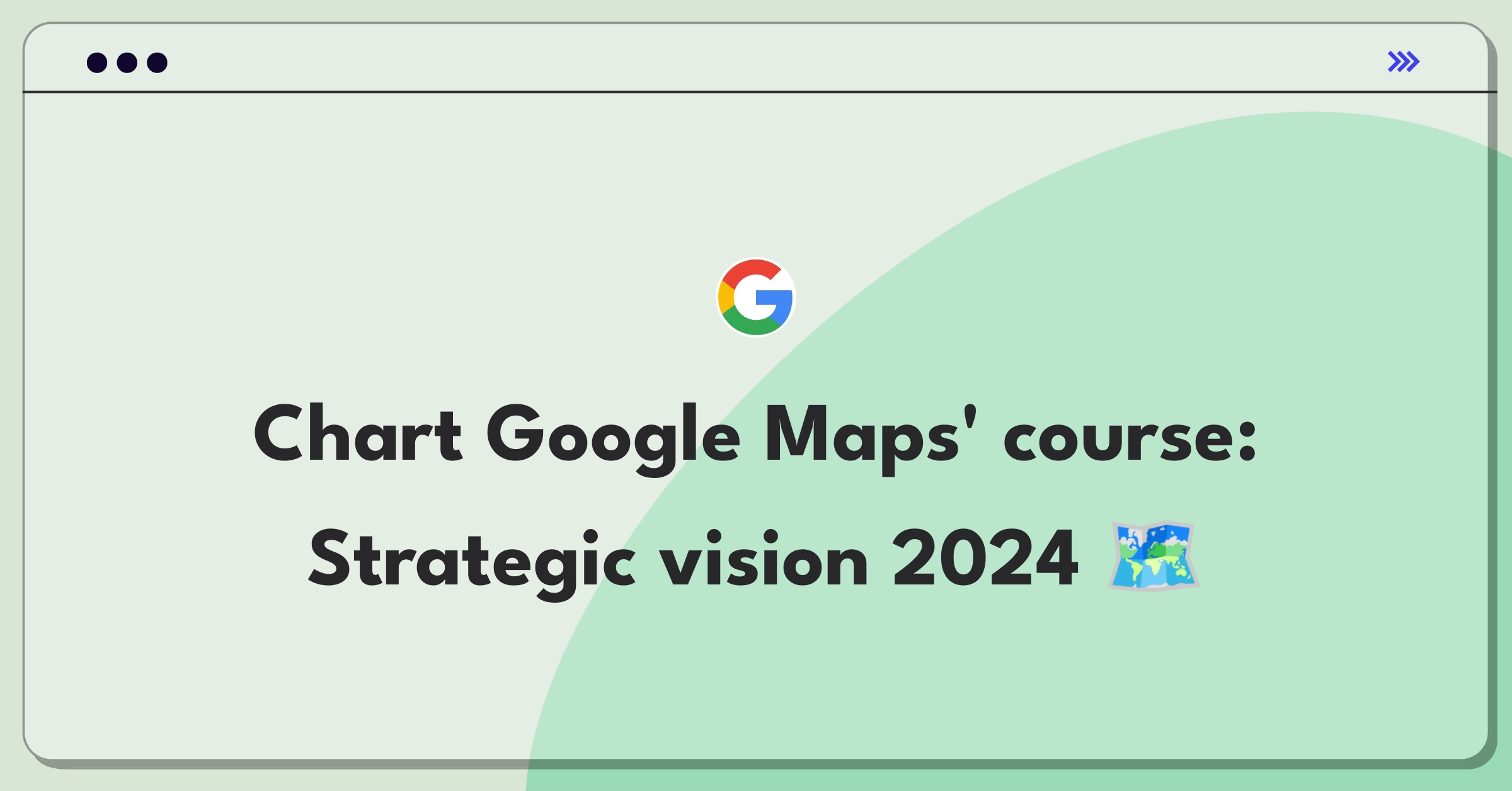Thank you for providing such a comprehensive framework for addressing this product strategy question. I'll structure my response accordingly, focusing on Google Maps and the goal for the next year. I'll present my answer as if I'm directly addressing the interviewer, using a first-person perspective and maintaining a professional tone.
Introduction
As a senior PM for Google Maps, setting the right goal for the next year is crucial for maintaining our market leadership and driving innovation in the geospatial technology space. Our objective should align with Google's broader mission to organize the world's information and make it universally accessible and useful, while also addressing the evolving needs of our users and the competitive landscape.
In my response, I'll outline a strategic approach that encompasses market analysis, product vision, prioritization of initiatives, execution planning, and risk management. This comprehensive strategy will ensure that our goals for Google Maps are both ambitious and achievable within the next year.
Step 1
Clarify the Strategic Goals (3-4 minutes)
Before diving into the specifics of our goal for the next year, it's crucial to clarify some key points about Google Maps' current position and the broader context:
Let me address these points based on my understanding and assumptions:
Primary Objective: Google Maps aligns with Google's mission by organizing and presenting geospatial information. Our goal should focus on enhancing accessibility and usefulness of location data while supporting Google's ad-based revenue model.
Why this matters: Ensuring alignment with Google's broader strategy is crucial for securing resources and support for our initiatives.
Hypothetical answer: Our primary objective is to increase user engagement and data accuracy while expanding opportunities for location-based advertising.
Impact on strategic approach: This will guide us to prioritize features that improve user experience and data quality, as well as those that enhance advertising capabilities.
Product Lifecycle Stage: Google Maps is in a mature stage but continues to innovate.
Why this matters: At this stage, we need to balance maintaining our core offering with introducing new features to stay ahead of competitors.
Hypothetical answer: We're in a mature stage but with significant room for innovation in areas like AR, AI-driven personalization, and integration with other Google services.
Impact on strategic approach: We'll focus on both incremental improvements to our core offering and exploring new, potentially disruptive features.
Customer Segments: Our key segments include individual users (for navigation and local search), businesses (for visibility and advertising), and developers (using our API).
Why this matters: Understanding our diverse user base helps us prioritize features that serve the needs of multiple segments.
Hypothetical answer: We'll focus on enhancing features for individual users while also improving our offerings for businesses and developers.
Impact on strategic approach: We'll need to balance consumer-facing features with improvements to our business and developer tools.
Market Context: Current trends include increased demand for real-time data, integration of AR in navigation, and growing concerns about data privacy.
Why this matters: Staying ahead of these trends is crucial for maintaining our market leadership.
Hypothetical answer: We're seeing a shift towards more personalized, real-time mapping experiences and growing competition from specialized mapping services.
Impact on strategic approach: We'll need to invest in real-time data capabilities, explore AR integration, and address privacy concerns proactively.
Resource Constraints: As part of Google, we have significant resources but must prioritize effectively.
Why this matters: Even with substantial resources, we need to make strategic choices about where to invest our efforts.
Hypothetical answer: While we have a large team and substantial technical resources, we need to be selective about which new features and technologies we pursue.
Impact on strategic approach: We'll need to carefully prioritize our initiatives and potentially partner with other Google teams or external partners for specialized capabilities.
Based on these clarifications, I'll proceed with my analysis and recommendations for Google Maps' goal for the next year.
Subscribe to access the full answer
Monthly Plan
The perfect plan for PMs who are in the final leg of their interview preparation
$99 /month
- Access to 8,000+ PM Questions
- 10 AI resume reviews credits
- Access to company guides
- Basic email support
- Access to community Q&A
Yearly Plan
The ultimate plan for aspiring PMs, SPMs and those preparing for big-tech
$99 $33 /month
- Everything in monthly plan
- Priority queue for AI resume review
- Monthly/Weekly newsletters
- Access to premium features
- Priority response to requested question


.png)